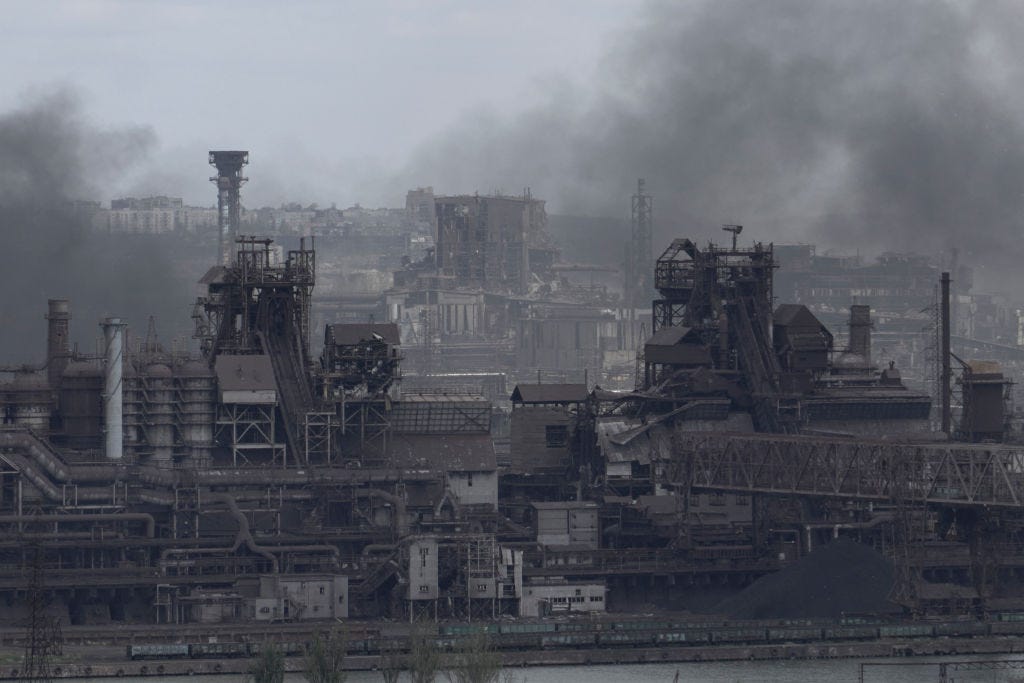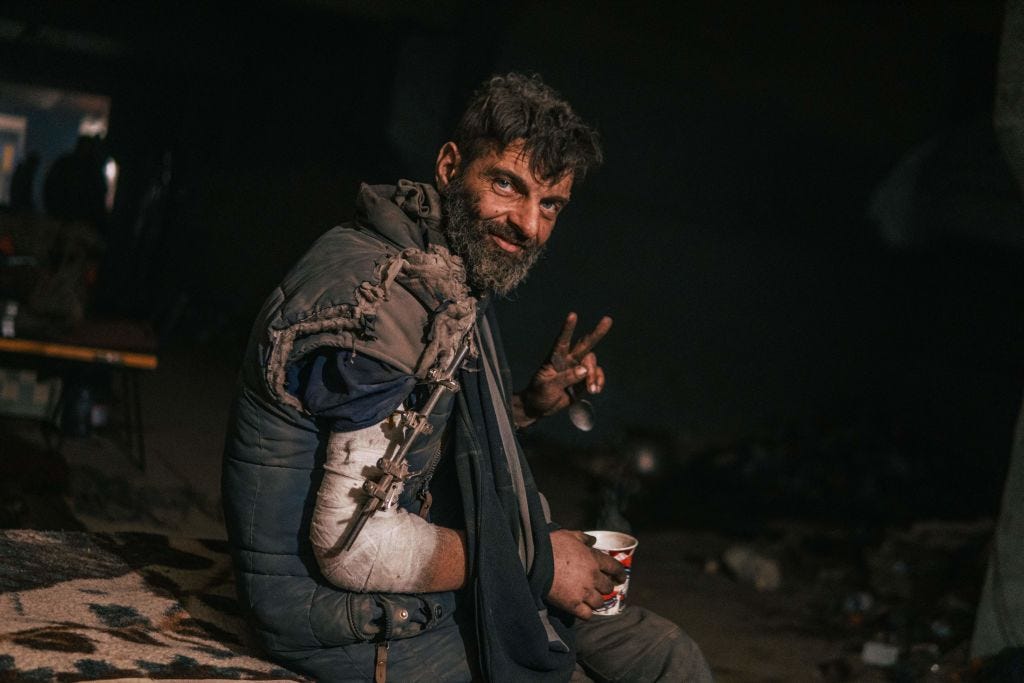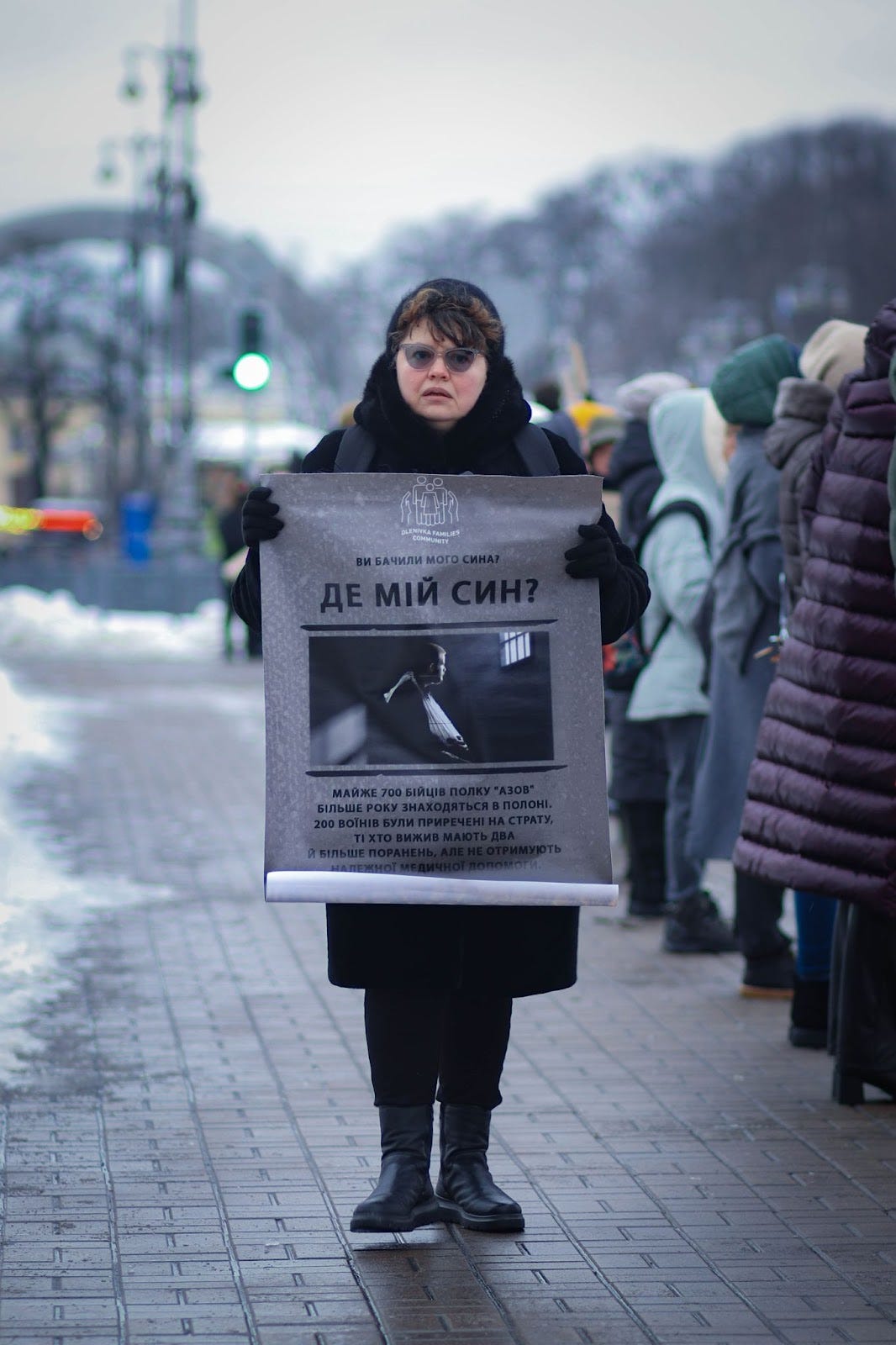Christmas without Yaroslav.
It’s a season for celebration, supposedly. But in Ukraine, mothers like Iryna are sitting down at tables with empty dinner settings for their sons. Hers is a prisoner of war.
Editor’s note: Know anyone who would benefit from a subscription to our on-the-ground, human-first style of reporting the news? Think of someone could improve their feature writing and knowledge of the world, or who just is really interested in Ukraine?
Give them the gift of a subscription to The Counteroffensive! Or, if you haven’t upgraded yourself, you can sign up below as well:
Iryna Kozyreva will spend the holiday season without her son.
She speaks longingly about him through tears: "My bunny, my heart, my boy.”
It’s hard enough to be without family over Christmas.
It’s excruciating not knowing what is happening to him.
"As long as my child is in captivity, I cannot celebrate anything at home. My thoughts are with him,” she said. “These Russian bastards came and stole our life, our peace, our joy and our serenity. There is no point in celebrating Christmas. That's why it's so hard.”
All throughout Ukraine this scene is repeating over and over again. Families will gather without loved ones. The terrible theme of the winter holidays is that someone is missing at the gathering.
An estimated 10,000 Ukrainian soldiers are currently in captivity.
Iryna’s son Yaroslav is just one of them.
She has five children, all of whom are adopted. She spoke with uncommon tenderness about her sons. Especially about Yaroslav.
When Yaroslav was nine years old, Iryna adopted him and his younger brother. The story behind why is sensitive, she added, and she didn’t want to talk about it.
“People become family not only through birth, marriage, or adoption. God gives such a gift of love that children have become my closest, dearest people on the planet,” she said. “There is such a depth of acceptance, trust, and shared joy that blood kinship is forgotten.”
Yaroslav is now 25 years old. He has spent two birthdays in captivity. But ever since he was a child, Yaroslav had a heightened sense of justice.
After students were beaten on the Maidan in 2013 and the Revolution of Dignity began, Iryna wanted to go to a rally. But Yaroslav did not want to let his mother go alone. In fact, neither of them wanted the other to go – so they went together.
"He was 15 years old at the time. I said, 'You can't go, it's dangerous there.’ And he said, 'Mom, if it's dangerous, you can't go either. We can't be orphans a second time.’ I sat down and thought about what to do, and while I was thinking, they were already dressed and ready to go," Iryna said with a smile, showing this photo.

When he grew up, Yaroslav decided to become a soldier. He joined the famous Azov military unit two years before the full-scale invasion last year.
On February 24, 2022, Yaroslav and his fellow soldiers were in Mariupol, a city in southern Ukraine that was among the first targets of the Russian onslaught.
From the first days he defended the city against the enemy invasion. He was almost immediately wounded.
"He had such a severe concussion that for several days he lost his sight, hearing, spatial orientation, coordination of movements, and could not even stand up. And every time a bomb hit, he threw up," Iryna said, "I said, 'Thank God for your injury, because otherwise you would have died with them’. And he said he would have liked to be with them. He has a very strong sense of guilt that he survived and they died.”
Because of his injury, Yaroslav ended up in Azovstal, a cavernous steel plant where Ukrainian defenders sought refuge as the Russian military surrounded them.
She was not able to communicate with Yaroslav very often. At best, once a day and only at night. So Iryna could stay awake at night and wait for a message from her son. Sometimes he would just write a ‘+’ sign, to let her know that he was alive.
From the first days of the full-scale invasion, Iryna realized that Mariupol would be completely surrounded. Yaroslav said he would never surrender. After all, he said, Azov fighters are the ones who are most abused in captivity.
"I asked him if he was going to commit suicide, and he said, 'No, mom, don't think about it. I have a few rounds of ammunition, I'll just face the enemy with a weapon and they'll shoot me,’” Iryna said with tears in her eyes.

But ultimately, as a soldier committed to following orders, he would have to go against his personal wishes. Ukrainian authorities commanded them to surrender after 86 days of holding out, in an effort to save the soldiers’ lives.
On May 18, 2022 Iryna spoke to her son for the last time. On that day he surrendered to the Russians.
"He wrote to me: ‘Forgive me for all the pain I have caused you.’ He wrote where he wanted to be buried," Iryna paused for a minute, crying, and continued: "He told me he kissed me and loved me."

He promised he would see her in just a few months. But his period of captivity has turned into an unbearable hell that lasted 19 months.
Yaroslav and some of his fellow prisoners were sent to Olenivka, an old, forgotten penal colony in the Donetsk region. From there, he managed to call his girlfriend several times. He said they were not beaten and were fed normally.
But as the Azov prisoners who have already been exchanged say in interviews, the conditions of captivity in Olenivka were terrible. The Russians beat the prisoners until they were semi-conscious, the prisoners had no beds to sleep in, no toilet or shower, and they were fed scraps and even small portions.
And then a terrible attack occurred: two months later, in July 2022, the Russian prison where Yaroslav was held was blown up. During the massacre in Olenivka – the Ukrainian military claims the Russians caused an explosion to cover up torture and murder there – dozens of Ukrainian prisoners were killed and up to 130 wounded.
The exact number of victims cannot be determined, as Russian authorities refused to grant unimpeded access to any independent commission after the incident.
Iryna did not believe that Yaroslav was dead. A few days later, she found his name on the list of those wounded in the attack.
"And then the hell began," Iryna recalled with horror. She imagined every single possible wound he might have gotten. "It seemed to me that if it wasn't in the stomach, they wouldn't treat him for sure. And that is certain death. Then, if only not in the head. What if amputation? Every few days I had a new nightmare in my head".
In September 2022, she found a video on the Russian news that showed Yaroslav.
"I saw two seconds of my son. He didn't say anything. When he was captured, I asked him: 'Son, tell them everything they want to hear so they torture you less.’ And he promised me. But I have not found a single word from him anywhere. He is silent," Iryna said.
In the video, Yaroslav appears to have lost 30 kilograms, or more than 65 pounds.
Since the tragedy, Iryna has had no contact with her son. She does not know what is happening to him now, where he is, how he feels. Her pain is compounded by the Christmas holidays.
Everyone around her is happy and living their lives.
The best New Year's gift for Iryna would undoubtedly be to exchange her son so that she could hug and kiss him.
"Once I had a dream about a [prisoner] exchange... I knew it was Yaryk [his nickname], and he recognized me, but he was a completely different person. Not the person I know. I watched him in my dream and wondered what would happen to him, if he had changed so much, how would he live? I woke up wet with tears. I was sobbing in my sleep," Iryna recalls.
But she has no plans to give up.
She regularly attends rallies in support of prisoners of war. She does everything possible to bring Yaroslav home and believes that day will come.
Iryna dreams that the Ukrainian Armed Forces will regain all Ukrainian territories. And most importantly, Crimea.
"I want to walk on our land,” she said. “Even if I am an old lady with a cane or in a wheelchair. I want to walk on our land with my own feet.”
We heard our readers’ concerns, in our recent survey, that we weren’t providing enough to our paid subscribers. “Restrict the information available to unpaid subscribers. Hard but fair I think," wrote one. Another added, "You're giving too much away for free."
So to be responsive we’re putting a paywall in front of our News of the Day and Reporter’s Notebook sections — if you haven’t, will you upgrade to a paid subscription to get access and support our journalism?
Today’s issue is devoted to prisoners of war.
Keep reading with a 7-day free trial
Subscribe to The Counteroffensive with Tim Mak to keep reading this post and get 7 days of free access to the full post archives.






